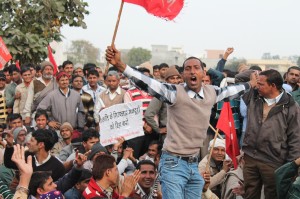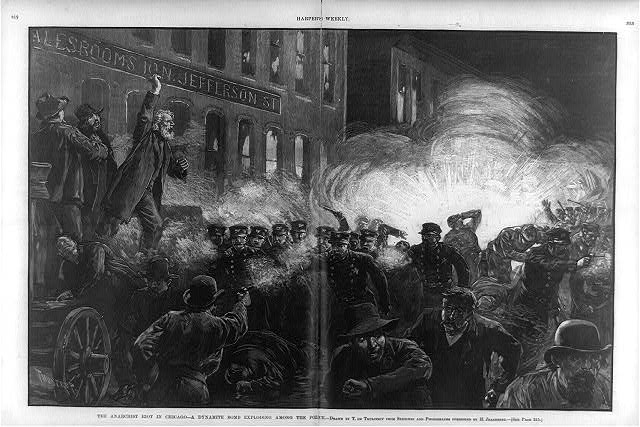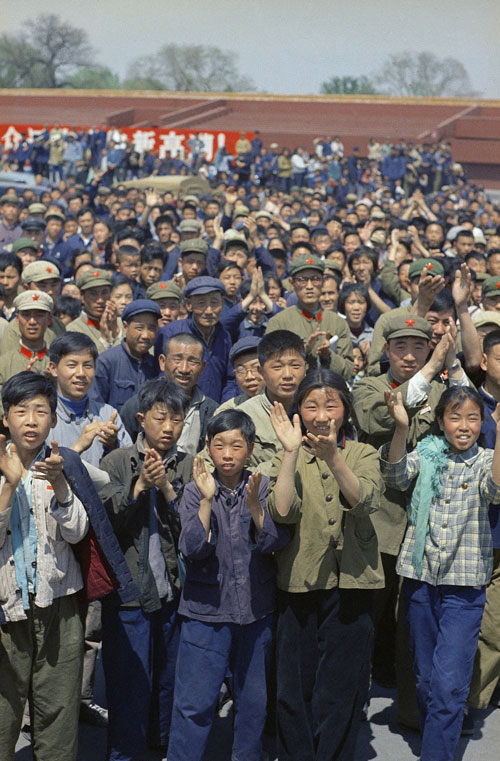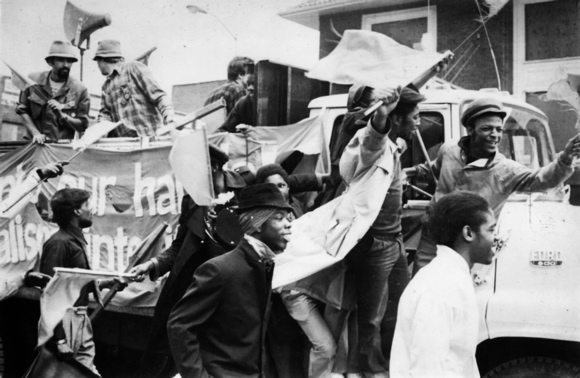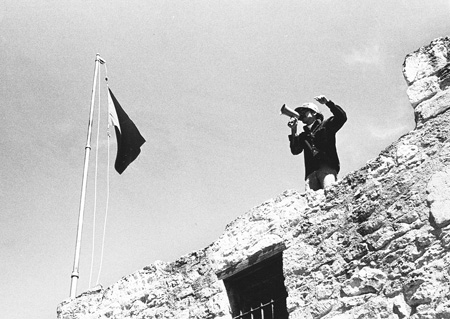The popular masses want to overthrow the capitalist, imperialist governments and
the governments who are their servants!
Proletarians want to unite for the Party of the revolution!
Communists support anti-imperialist struggles and develop People’s Wars for the world proletarian revolution!
Imperialism is the "highest stage of capitalism” —a stage of “parasitism and decay” (Lenin, Imperialism, the Highest Stage of Capitalism).
Now is the time to bury it, as soon as possible. The crisis of capitalism is like a chronic disease that torments it. It creates the grounds for its death.
The crisis of capitalism is above all a crisis of overproduction: “In these crises, there breaks out an epidemic that, in all earlier epochs, would have seemed an absurdity —the epidemic of over-production. Society suddenly finds itself put back into a state of momentary barbarism.” (Marx and Engels, The Communist Manifesto)
But it is the time when the bourgeoisie intensify its efforts to make the proletarians and masses pay for the crisis. As Marx and Engels have written more than 150 years ago in the Communist Manifesto:
“The weapons with which the bourgeoisie felled feudalism to the ground are now turned against the bourgeoisie itself. But not only has the bourgeoisie forged the weapons that bring death to itself; it has also called into existence the men who are to wield those weapons — the modern working class —the proletarians.”
Today, the world proletarians have never been so numerous, along with the people’s masses they represent at least 90% of the population; and these 90% are those who are affected by the crisis and need a radical change in the society. “The proletarian movement is the self-conscious, independent movement of the immense majority, in the interest of the immense majority.” (Ibid.)
The financial crisis of global capitalism deepens and widens. The imperialists argue among themselves to plunder all types of resources (human and material) in the backward countries, in addition to increasing the exploitation of workers and the middle class in their own countries in order to overcome this crisis.
In Europe and the capitalist countries, this results in a restructuring of the production, trade and services, which leads to the displacement of production in countries where the cost of labour is lower, a massive destruction of jobs and the introduction of new and more productive means of production at the expense of the safety and health of workers.
At the same time, taxes are increasing, wages are falling and benefits are reduced. In general, the intensification of the crisis implies that “small tradespeople, shopkeepers, and retired tradesmen… —all these sink gradually into the proletariat” (ibid.).
In countries oppressed by imperialism, the proletariat and people of Africa, Asia and Latin America are subject to the dictates of the imperialist powers, who are protected by their local watchdogs; those powers discard their watchdogs when they no longer defend or badly defend their interests.
The imperialist powers use the policy of “divide and rule” and do not hesitate to militarily intervene - both to support regimes of their servants or to topple those not favourable to them - and to provoke ethnic and religious conflicts to protect their interests and break people’s resistance to oppression. They rely on religious obscurantism or secular liberalism to maintain by any menas their economic, political and ideological domination.
The ruling classes of these countries, be they rising 3rd world powers - China, India, Brazil or South Africa – or oppressed countries, are doing everything possible to ensure maximum exploitation of the labour force and access and control on raw materials in the interests of the imperialist system.
In the imperialist and oppressed countries, the ruling classes use as watchdogs the reactionary right forces as well as the reformist, social democratic and revisionist forces that apply their policy of exploitation and oppression of proletarians and masses. Official trade unions are working with the various governments to negotiate “austerity measures” and privatisation schemes so that the workers reconcile with them and to stop the struggles that clash against the bosses and the state. The reconciling always allows capitalists to strengthen and continue their destructive work undermining the gains won by the working class through a hundred years of struggle.
In imperialist countries, the more openly reactionary right and also the reformist and social democrat “left” uphold through different forms the “national identity”, to use it against the immigrants in order to strengthen the division of the proletariat and the masses and thus opening the way to old and new fascism. Many populist, fascist and neo-Nazi parties and organizations are thriving on the fertile land cultivated by all the traditional political forces and institutions. The bourgeoisie defends its system and institutions with the state police and also by using the mass participation in elections. This is why the proletariat and the masses must develop the electoral boycott and intensify the class struggle.
“IT IS RIGHT TO REBEL” (MAO ZEDONG)
Faced with the crisis, the proletarians —the workers from the cities and the countryside— are rebelling. Workers from factories threatened with closure are mobilizing against layoffs, the degradation of working conditions, wage cuts and increased working time, because they don’t want to pay for the crisis. Peasants and agricultural workers resist and sometime are occupy land. The masses are mobilizing against housing evictions, tax increases, attacks on their environment, the dismantling of public services, attacks on union freedoms and the rights of youth, women, etc.
These struggles are taking place in all the countries in the world, like those of the auto and metallurgy workers in France, Belgium, Germany and Italy, of the miners In Spain, while masses are fighting against housing evictions, and the great students' struggle in Canada, and in other countries also, against attacks on education and tax increases.
And, moreover, like those in India where hundreds of millions of workers went on strike, or South Africa, where miners rebelled against the black and ruling classes who exploit and oppress the workers, or Brazil, where poor peasants and landless are occupying the land they work.
In the Arab countries, particularly in Tunisia and Egypt, despite the manoeuvres of imperialists to protect their interests and support the new watchdogs, despite the fact that these watchdogs are hiding themselves under the mask of religion in order to exploit workers and people, to suppress the just rebellion before it becomes revolution, the masses are finding their way and learning from their mistakes, for a genuine New Democratic revolution, that cannot be achieved without the leadership of the working class; this raises the questions of the revolutionary strategy, of armed struggle, and the building of a vanguard party.
Imperialists and their interventions are not able to stop and extinguish the anti-imperialist struggles in the world, from Palestine, to Iraq, Afghanistan, Latin America, nor against the new imperialist interventions in Libya, Syria, Mali.
YOU CANNOT MAKE REVOLUTION IN A PEACEFUL WAY!
The world is in turmoil; the ideological understanding operates bit by bit or with leaps, with advances and setbacks, in the ranks of the proletariat and the masses and on the consciousness of the crisis and the nature of imperialism, the need to overthrow it and build a new society on the ashes of the old one.
In this new wave of struggle and resistance we must support and strengthen the struggle for the liberation of peoples and for new democracy, towards socialism and communism. This is the context in which a potential new wave of the world proletarian revolution develops and emerges. It has as its reference points and strategic anchor the people's wars led by Maoist parties.
People’s War is the most advanced way to make revolution, so we must support in every country in which it is being organized, prepared by accumulating forces, and applied to the concrete conditions of each country.
Led by the CPI (Maoist), the People’s War in India is successfully resisting attacks from the enemy and is managing to expand and grow. The People’s War is also unfolding in the Philippines under the leadership of the Communist Party of the Philippines, which upholds Maoism.
In Peru, it is continuing despite the action from a liquidationist current. In Turkey, the revolutionary struggle led by the Maoists is advancing in accordance with the people’s war strategy. In other countries, new initiatives and advances are in preparation.
We must build and consolidate the proletarian parties for the revolution, parties of new type, Marxist-Leninist- Maoist communist parties, in our respective countries, taking into account our past experience and applying it to the current conditions of the imperialist system of today.
This was clearly expressed the 24th November 2012 in Hamburg by the great International Conference in Support of the People’s War in India, in which hundreds of representatives of revolutionary and anti-imperialist organizations and Maoist parties and organizations from more than twenty countries have called to unite and strengthen the class struggle in each country. It was a great example of internationalism.
We must advance to further strengthen and give organisational form to proletarian internationalism.We must pursue the international unity of the communists in the world towards the construction of a new international organization to fight together against imperialism and reaction and march together towards a new Communist International, for socialism and communism. .
Proletarians and oppressed people of all countries, unite!
Down with imperialism and all its watchdogs!
Long live proletarian internationalism!
Long live world proletarian revolution!
Communist (Maoist) Party of Afghanistan;
Communist Party of India (M-L) Naxalbari
Maoist Communist Party–France;
Maoist Communist Party–Italy;
Revolutionary Communist Party (PCR-RCP Canada),
Maoist Communist Movement, Tunisia;
MKP - Turkie North Kurdistan - France
Democracy and Class Struggle - Wales - British State
Committee of Building of Maoist Communist Party Galice – Spanish State.
Great March towards Communism - Madrid - Spain,
New Marxist Study Group (NMSG) Sri Lanka
Solidarity of People Struggle Indonesia
Communist Organisation Future Rouge - France
Servir le peuple – Sheisau sorelh - Occitany- French State

